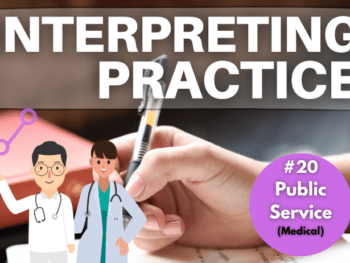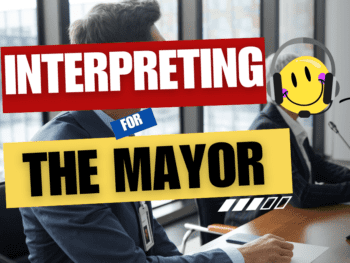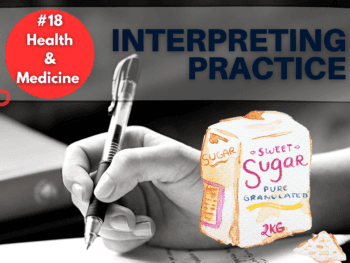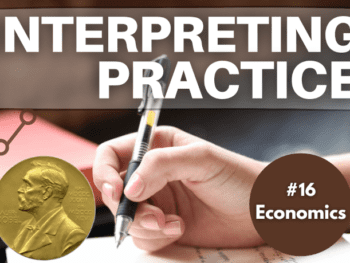A very special exercise to practice your conference or simultaneous interpreting skills: be Barack Obama’s interpreter for a day! This is a FICTICIOUS Obama interview to help you get used to a more dynamic (and realistic) pace.
Topic(s): Politics
Terms: healthcare reform, uninsured, underinsured, Affordable Care Act, recession, Great Depression, job growth, auto industry, clean energy, tax relief, “Don’t Ask, Don’t Tell”, mass incarceration, immigration reform, climate change, renewable energy, carbon emissions, climate crisis, insurance company, Osama bin Laden, 9/11 attacks, Paris Agreement, partisanship, political gridlock, Congress, nonviolent offenders
Sources: While the mock interview is entirely fictitious, I did my very best to only include accurate information.
Also check these books to learn and practice interpreting.
Good For Practicing:
- Simultaneous Interpreting
- Conference Interpreting
- Political Terminology
Also available on Speechpool.
If you’ve found this post helpful or think it could be useful to a friend who perhaps is – or is planning to become – an interpreter, please kindly consider buying me a coffee by using the button below:
I put all my heart and soul into the content I produce in order to help my fellow linguists set foot in the industry. Most of what I do is available to everyone for free.
Donating is 100% optional, but greatly appreciated. A short espresso will do! ☕
Script*:
*Please check the script only after you’ve done the note-taking exercise, otherwise that’s cheating! 🙂
Interviewer: Good evening, ladies and gentlemen. Today, we have a very special guest with us, the 44th President of the United States, Barack Obama. Welcome, Mr. President.
Obama: Thank you, it’s great to be here.
Interviewer: As we reflect on your time in office, let’s start by discussing your successes as president. What achievements are you most proud of?
Obama: Well, there were many accomplishments during my presidency that I’m incredibly proud of. One of the top priorities for my administration was healthcare reform, and I believe the passing of the Affordable Care Act was a significant step forward. It brought healthcare coverage to millions of Americans who were previously uninsured or underinsured. It was a hard-fought battle, but the impact it had on people’s lives was truly transformative.
Another success was the economic recovery following the 2008 financial crisis. We managed to pull the country out of the deepest recession since the Great Depression and set the stage for steady job growth and a revitalized economy. We implemented policies that rescued the auto industry, invested in clean energy, and provided tax relief to the middle class, all of which helped fuel our recovery.
Furthermore, I’m proud of the progress we made in the area of social justice and civil rights. We repealed “Don’t Ask, Don’t Tell” and ended the exclusion of openly gay and lesbian individuals from serving in the military. We also made significant strides in criminal justice reform and took steps towards reducing mass incarceration. These were all important steps in creating a fairer and more inclusive society.
Interviewer: Those are indeed notable accomplishments. However, looking back, what failures or disappointments do you acknowledge from your time in office?
Obama: As with any presidency, there were certainly setbacks and areas where I wished we could have achieved more. One of the most significant disappointments for me was not being able to achieve comprehensive immigration reform. We faced significant opposition, and despite efforts to find common ground, we were unable to pass meaningful legislation that would have addressed the broken immigration system. This remains an issue that demands attention and a solution.
Additionally, I regret that we were not able to make more progress on addressing the issue of climate change. While we took steps to promote renewable energy and reduce carbon emissions, it was clear that more needed to be done. The urgency of the climate crisis required bolder action, and I believe we fell short in fully seizing that opportunity.
Interviewer: Thank you for your candid response, Mr. President. Now, let’s focus on your personal highlights. What accomplishments do you consider to be the most significant and meaningful to you on a personal level?
Obama: Personally, I consider the passage of the Affordable Care Act to be one of the most significant achievements. I’ve always believed that access to affordable healthcare is a fundamental right, and seeing millions of Americans gain coverage and protection from insurance company abuses was deeply gratifying. It’s something that will have a lasting impact on people’s lives for generations to come.
Another deeply meaningful moment for me was the successful operation that resulted in the death of Osama bin Laden. The capture and elimination of the mastermind behind the 9/11 attacks was a testament to the bravery and skill of our military and intelligence agencies. It was a moment of closure for many Americans and a clear message to those who would seek to harm us.
Furthermore, the Paris Agreement on climate change stands out as an achievement that holds personal significance. It represented a global commitment to address one of the greatest challenges of our time, and the fact that the United States was able to play a leading role in negotiating the agreement was a source of pride for me.
Interviewer: Thank you for sharing those moments, Mr. President. Lastly, if you could go back and change anything about your presidency, what would it be, and what would you have done differently?
Obama: Hindsight is always 20/20, and there are certainly things I wish I had handled differently. One area that comes to mind is the level of partisanship and polarization in Washington. Despite my efforts to bridge divides and find common ground, the level of political gridlock persisted. Looking back, I might have tried different approaches or engaged with Congress in different ways to try and break through those barriers.
Additionally, while I’m proud of the progress we made in the area of criminal justice reform, I believe we could have done more to address systemic issues within the justice system. The issue of mass incarceration, particularly of nonviolent offenders, remains a challenge, and I wish we had been able to make more substantial reforms during my presidency.
Interviewer: Thank you, Mr. President, for your thoughtful responses. We appreciate you taking the time to join us today and share your reflections on your time as president.
Obama: It was my pleasure. Thank you for having me, and thank you to everyone watching.














 Interpreting Training Exercise | The Nobel Prizes
Interpreting Training Exercise | The Nobel Prizes